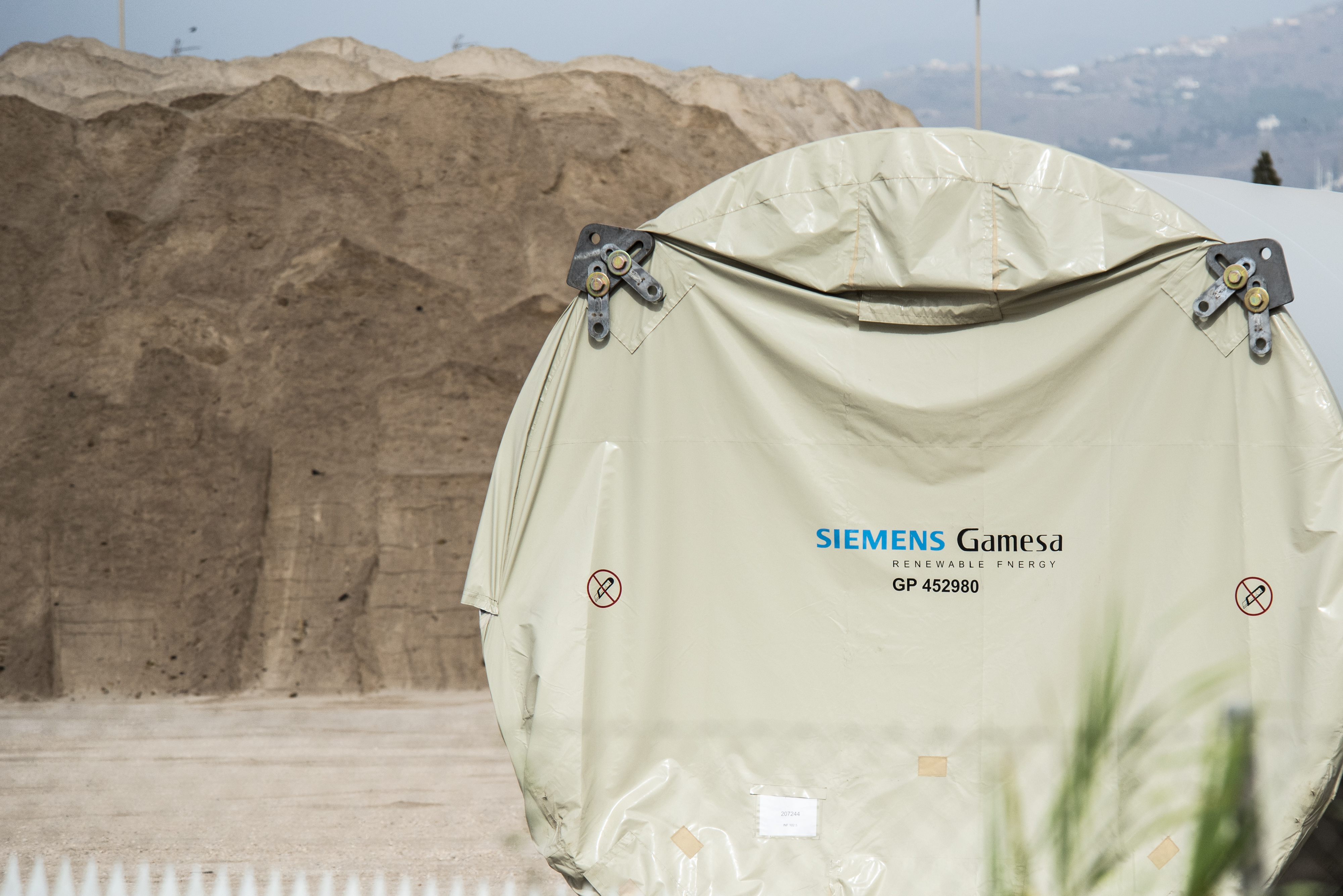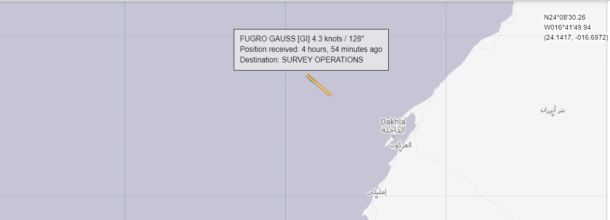
In 2010, the Dutch company Fugro promised to never again undertake operations in occupied Western Sahara. On Christmas Eve 2019, their vessels returned.
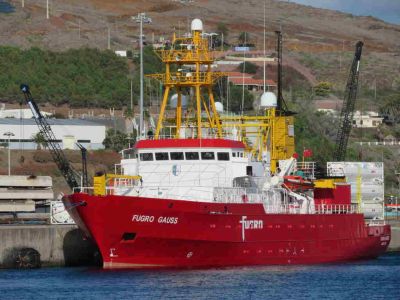
This story was initially published on 24 December 2019 with incorrect information that Fugro was engaged in seismic studies for oil exploration. This was rectified on 31 December.
On 24 December, the seismic survey vessel Fugro Gauss appeared offshore the town of Dakhla in occupied Western Sahara. The operation is remarkable, in view of Fugro NV having explicitly stated to never again undertake operations in the territory.
In a letter to Western Sahara Resource Watch (WSRW) on 30 December, Fugro confirms having carried out an operation in Western Sahara waters. The company states that the purpose of the operation was "to perform servey services for a Telecommunication Cable project which includes multiple territories and jurisdictions".
WSRW initially wrote on its websiste 24 December that the operation was related to oil exploration. That was incorrect.
The company confirmed to WSRW that "the Saharawi authorities were informed in detail" about the project, but that the authorities had not responded to correspondence. As such no consent has been obtained from the representative body of the Saharawi people.
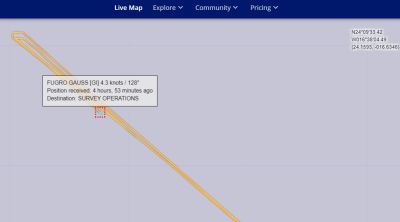
Fugro has been repeatedly involved in Western Sahara (see chronology below). The most recent episode, was when its Norwegian subsidiary Fugro-Geoteam AS in 2010 undertook exploration on behalf of the US company Kosmos Energy on a licence in 2009. Fugro-Geoteam responded to the critique by declaring it would never again carry out surveys off the coast of the territory. In a letter to the Norwegian Ministry of Foreign Affairs, Fugro-Geoteam, a subsidiary of Fugro NV, stated that it “has decided to abstain from any further involvement in Western Sahara until the political situation has been resolved".
Fugro-Geoteam’s Dutch parent company, Fugro NV, announced shortly after that it had the same policy as of Fugro-Geoteam, being “aware of, and endorses, the letter sent by Fugro-Geoteam AS dated 23 April 2010 to the Norwegian contact point for OECD”. It declared that the Western Sahara policy applies to all companies in the group.
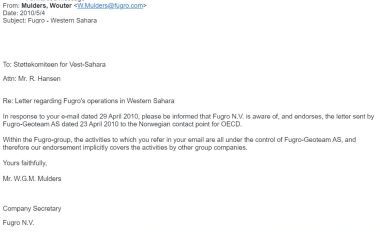
The basis for Fugro NV's 2010 policy statement was that the Norwegian Support Committee for Western Sahara in 2009 had registered a complaint with the Norwegian OECD contact point over violation of OECD’s guidelines for multinational companies. On the basis of Fugro-Geoteam’s apparent final exit from the territory, the Norwegian Support Committee announced that it had withdrawn the complaint, but that it would proceed with a complaint in the Netherlands unless the same guarantee would be given by the mother firm.
In 2012, Fugro's CEO clarified that its 2010 termination of activities in Western Sahara was due to a lack of local consultation.
The Court of Justice of the EU has on three occasions since 2016 confirmed that deals in Western Sahara must respect the Saharawi's right to consent.
Fugro Gauss (IMO 7824883, Gibraltar flagged) is managed and operated by Jasmund Shipping GmbH & Co, Bremen, Germany. Its registered owner is Foster Shipping NV. Insurance by Norwegian company GARD. Fugro Supporter (IMO 8518364, Bahamas flagged) is managed and operated by Fugro Marine Services BV in the Netherlands, a subsidiary of the Fugro NV group. Registered owner is Thalassa Z Maritime Co. Group Owner Maritime Consortium Inc-GRC. Insured by Norwegian company GARD. See technical details on Fugro Gauss here.
History of Fugro in Western Sahara
- 1990s: Most likely, Fugro Airborne Surveys undertakes air studies of Western Sahara, over the Dakhla area.
- June-September 2002: Fugro Geoteam AS participates in the seismic exploration of Western Sahara, commissioned by Norwegian seismic services company TGS-Nopec, which in turn worked on behalf of US company Kerr-McGee and French TotalFinaElf. The Norwegian Support Committee was asked by Fugro-Geoteam to direct requests to the mother company Fugro NV.
- 2003: UK company Svitzer Ltd (or possibly Svitzer Marine), a subsidiary of Fugro NV, has its vessel Svitzer Meridian operating in Western Sahara until June 2004.
- 2003: UK company Robertson Research, a subsidiary of Fugro NV, markets data from Western Sahara.
- 6 June 2004: Polisario writes Fugro NV.
- 30 July 2004. Pro-Saharawi solidarity associations meet with the directors of Fugro at the company headquarters in the Netherlands. The company states that all companies in the group were to contact the management if they ever were to receive requests or offers relating to Western Sahara in the future. At the time of the meeting, no operation was taking place.
- 1 June 2006: WSRW writes Fugro to follow up the meeting at Fugro’s headquarters.
- 6 June 2006: Fugro writes in a letter that it would not undertake future operations in Western Sahara.
- January 2009: Despite of previous promises, Fugro-Geoteam AS, a Norwegian subsidiary of Fugro NV, starts seismic studies in Western Sahara, commissioned by Kosmos Energy. The issue caused an outcry, with protests from the Saharwi government and civil society. The Saharawis brought the issue up to the UN Security Council. WSRW wrote Fugro on 13 January 2009.
- 2009: The Norwegian Support Committee for Western Sahara files a complaint against Fugro Geoteam to the Norwegian National Contact Point of the OECD Guidelines for Multinational Companies, for violation of the OECD Guidelines, arguing that violating the Saharawi people's right to self-determination over their own natural resources constitutes a human rights violation, and hence, a violation of the OECD Guidelines' paragraph on human rights.
- 23 April 2010: Fugro-Geoteam AS writes to the Norwegian National Contact Point of OECD that it has “decided to abstain from any further involvement in Western Sahara until the political situation has been resolved”.
- 29 April 2010: The Norwegian Support Committee for Western Sahara announces to the mother company Fugro NV that it had withdrawn the complaint against the subsidiary in Norway, but that it would proceed with a complaint in the Netherlands unless the same guarantee would be given by the mother firm.
- 4 May 2010: Fugro NV confirms in a letter that it “is aware of, and endorses, the letter sent by Fugro-Geoteam AS dated 23 April 2010 to the Norwegian contact point for OECD”. It declares that the Western Sahara policy applies to all companies in the group. This letter from 20 March 2010 is part of same correspondence.
- 2012: Fugro's CEO clarifies in an investor meeting that its 2010 exit was due to a lack of local consultation. "The company is often involved in oil and gas exploitation in areas where the local population has not been consulted. For that reason, the company has for instance stopped its involvement in Western Sahara”.
- 9 November 2019: The vessel Fugro Supporter arrives Dakhla port, only to stay in Western Sahara waters two days.
- 24 December 2019: The vessel Fugro Gauss is observed operating offshore Western Sahara, for a week-long seabed survey.
- 30 December 2019: Fugro confirms to WSRW that its position from 2010 to "abstain from any further involvement in Western Sahara until the political situation has been resolved" remains unchanged.
SRI update
The following overview enlists stock-exchange registered companies with current or recent operations in occupied Western Sahara. Updated 10 April 2025.
Siemens Energy misrepresents EU Court rulings
The German multinational - which supplies the Moroccan energy projects in the occupied territory - fails to grasp EU court rulings.
Brazilian cement giant Votorantim behind sand plunder
WSRW was present as the Brazilian company Votorantim last week received a cargo of sand from occupied Western Sahara in Tenerife, Spain.
Engie starts power production on occupied land
WSRW strongly condemns Engie's blatant disdain for international law in occupied Western Sahara.
